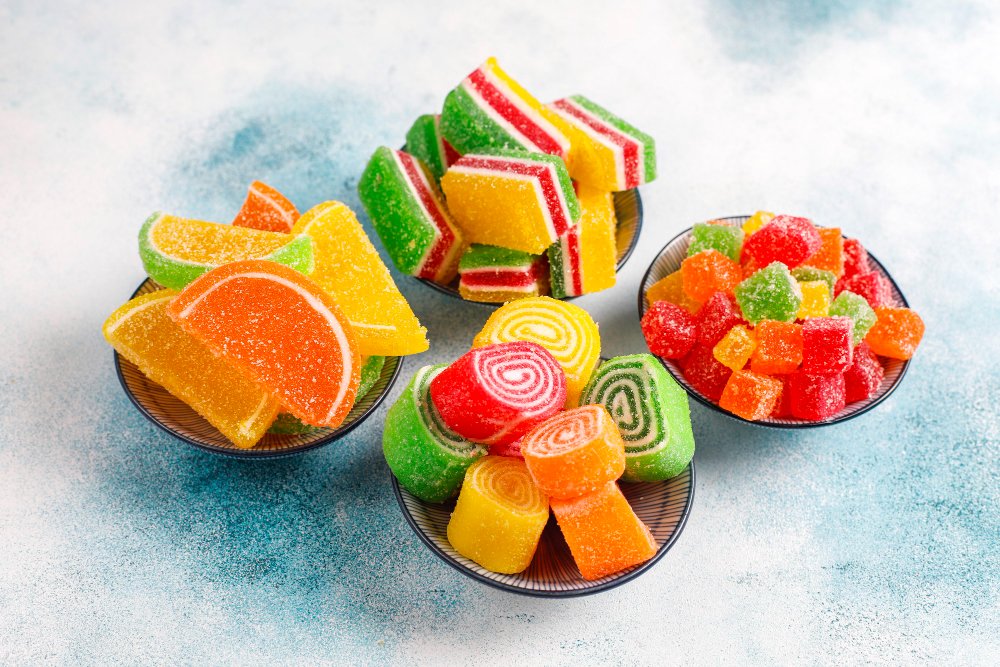
How to Make Mix Fruit Candy at Home
Ingredients
- 1 cup fresh or frozen mixed fruits (e.g., strawberries, mangoes, blueberries, kiwis)
- 2 cups granulated sugar
- 1 cup water
- 2 tablespoons lemon juice
- Powdered sugar (optional, for coating)
Instructions
- Prepare the Fruit:
- Wash and dry the fruits thoroughly.
- Chop the fruits into small, bite-sized pieces.
- Make the Sugar Syrup:
- In a medium saucepan, combine the granulated sugar and water.
- Heat over medium heat, stirring until the sugar is completely dissolved.
- Add the lemon juice and bring the mixture to a boil.
- Once boiling, reduce the heat and simmer until the syrup reaches 250°F (121°C) on a candy thermometer (hard ball stage).
- Add the Fruits:
- Carefully add the fruit pieces to the hot syrup, stirring to coat them evenly.
- Continue to simmer until the fruit becomes translucent and the syrup thickens, about 20-30 minutes.
- Dry the Candy:
- Using a slotted spoon, transfer the candied fruit pieces to a baking sheet lined with parchment paper.
- Spread the pieces out so they don’t touch.
- Allow the fruit to cool and dry for several hours or overnight.
- Optionally, you can roll the dried fruit pieces in powdered sugar to prevent sticking.
- Store the Candy:
- Once completely dry, store the mix fruit candy in an airtight container to keep it fresh.

Starting a Small Candy Business
1. Developing Your Brand
Brand Identity:
- Choose a catchy and memorable name for your candy business.
- Design a logo that reflects the fun and vibrant nature of your product.
- Create a tagline that highlights the unique selling point of your candies (e.g., “Sweet Delights with Real Fruit Bites”).
Packaging:
- Invest in attractive and practical packaging that keeps your candy fresh and appealing.
- Ensure your packaging includes your brand logo, name, tagline, and necessary product information (ingredients, expiration date, etc.).
Online Presence:
- Build a professional website showcasing your products, story, and contact information.
- Utilize social media platforms to engage with potential customers and promote your products.
2. Market Research and Strategy
Identify Your Target Market:
- Determine who your ideal customers are (e.g., health-conscious consumers, parents looking for healthier candy options, etc.).
- Conduct surveys or focus groups to gather feedback on your product and packaging.
Pricing:
- Calculate your costs (ingredients, packaging, labor) and set a competitive price point.
- Consider offering various sizes or bulk options to cater to different customer preferences.
Sales Channels:
- Sell directly to consumers through your website or at local farmers’ markets, fairs, and events.
- Approach local grocery stores, specialty food shops, and cafes to carry your products.
- Explore online marketplaces like Etsy, Amazon, or local online marketplaces.
3. Production and Scaling
Equipment and Ingredients:
- Invest in reliable kitchen equipment for candy production, such as candy thermometers, saucepans, and drying racks.
- Source high-quality fruits and other ingredients to ensure consistency and taste.
Production Space:
- If starting from home, ensure your kitchen meets local health and safety standards.
- As your business grows, consider renting a commercial kitchen space to increase production capacity.
Quality Control:
- Implement strict quality control measures to ensure each batch of candy meets your standards.
- Regularly test new recipes and variations to keep your product line fresh and exciting.
4. Marketing and Promotion
Social Media Marketing:
- Use platforms like Instagram, Facebook, and TikTok to showcase your candy-making process, new products, and customer testimonials.
- Run promotions, contests, and giveaways to increase engagement and attract new customers.
Local Advertising:
- Distribute flyers and business cards at local events and businesses.
- Partner with local influencers or bloggers to promote your candy.
Customer Feedback and Reviews:
- Encourage satisfied customers to leave reviews on your website and social media pages.
- Use positive feedback in your marketing materials to build credibility and attract new customers.
5. Legal Considerations
Licensing and Permits:
- Research and obtain necessary business licenses and permits required for food production and sales in your area.
Health and Safety:
- Ensure your production process complies with local health and safety regulations.
- Consider obtaining food safety certification to build trust with customers and retailers.
By following these steps, you can turn your passion for making mix fruit candy into a successful small business. Enjoy the process of creating delicious treats and sharing them with your community while building a brand that stands out in the market.




